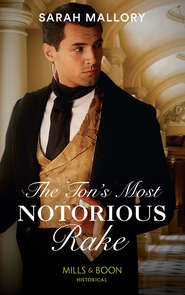По всем вопросам обращайтесь на: info@litportal.ru
(©) 2003-2025.
✖
A Regency Baron's Bride: To Catch a Husband... / The Wicked Baron
Настройки чтения
Размер шрифта
Высота строк
Поля
Kitty would have preferred to slip on to one of the benches at the back of the room but Ann had spotted empty chairs much nearer to the dais where the speaker would be standing and was already making her way towards them, so Kitty had no alternative but to follow. At the front of the room a tall gentleman with a shock of red hair was opening up a large trunk in the centre of the dais and she heard someone address him as Mr Clarkson. Kitty regarded him with interest, for she had read a great deal about the fiery speaker who travelled all over the country promoting the abolition movement with evangelical zeal. He was very pale and there were dark circles beneath his eyes: she suspected he was worn down by the arduous task he had set himself.
‘Oh, goodness,’ hissed Ann suddenly. ‘Look who has walked in! You see how wise we were to disguise ourselves.’
Kitty turned to see Daniel Blackwood striding towards the front of the room. As he approached, Mr Clarkson looked up and greeted him with every appearance of delight.
‘Well, of all people I did not expect to see Mr Blackwood here,’ Ann whispered. ‘Bertram told me he is connected to one of the foremost shipping families in Liverpool, and they derive a great part of their fortune from slaves, you know. However, he does seem to be on the best of terms with our speaker.’
There was no opportunity for Kitty to reply because at that moment a large bewhiskered gentleman banged on the table to bring the meeting to order. From behind the safety of her veil Kitty allowed her eyes to follow Daniel as he retreated to a chair at one side of the room. The audience hushed as Mr Clarkson began to address the crowd.
Kitty had not known what to expect from the meeting: she had read in the newspapers about the Abolition meetings held in Manchester and Leeds, but when Mr Clarkson began to explain about the horrific conditions endured by the slaves during their long sea voyage from Africa to the West Indies she found her indignation growing, and when he reached into the trunk and took out the thumbscrews, shackles and branding irons that he had collected during his investigations into the cruelty of the trade, she felt physically sick. Kitty was not alone in her sentiments: murmurs of outrage ran around the room during the meeting and she heard cries of anguish from some of the other ladies present. She was so incensed that when the meeting ended she ignored Ann’s whispered protests and joined the queue of people waiting to sign their name to a petition that would be presented to Parliament.
‘What is the point in our coming here so secretly if you are going to declare yourself?’ demanded Ann, standing beside her.
‘I do not think my name will stand out amongst the hundreds already written on the paper,’ she replied as she took up the pen. ‘Besides, I want to show that I am opposed to such cruel practices. My father certainly would have approved of my actions. There … it is done.’
Ann grasped her arm. ‘Very well, now let us get out of here before we are discovered.’
They were forced to walk in line between the rows of empty chairs that stood between them and the door. Ann led the way and Kitty followed, head bowed, lost in her own thoughts. Suddenly she realised that her friend had stopped and she looked up to find Daniel Blackwood blocking their way. He towered over them, unsmiling, as he inclined his head.
‘Miss Harworth, Miss Wythenshawe.’
‘M-Mr Blackwood, what a pleasant surprise!’ replied Ann, quick to recover her composure. ‘If we had known you were coming here—’
He interrupted her, saying drily, ‘You would not ask me to believe that Lord Harworth knows you are here unattended.’
‘Well, no,’ confessed Ann, while Kitty stood silently behind her. ‘However, we were determined to come, and it is such a worthy cause!’
‘It is, of course,’ he responded gravely. ‘But you will notice that all the other ladies here are accompanied by a gentleman. If you will give me a moment, I shall escort you home.’
His tone brooked no argument and he went off to take his leave of Thomas Clarkson. Ann turned to Kitty.
‘Well, it was unfortunate that he recognised us, but I think we may yet persuade him not to give us away.’ She added philosophically, ‘And if Mama does learn of our coming here, at least she will be comforted to know that we had Mr Blackwood’s escort.’
By the time they left the meeting room the crowd had disappeared and it was a matter of moments to find a cab to take them back to Cavendish Square. They were still settling themselves into the worn leather seats when Ann threw back her veil and demanded to be told how Mr Blackwood had recognised them.
‘I made sure with our cloaks and veils no one would know us,’ she added.
‘As a guest in your house you should expect me to recognise your maid, Miss Harworth,’ he replied with the glimmer of a smile. ‘And since I was in the room when you asked your brother to send the carriage for Miss Wythenshawe, I deduced that she was your companion.’
Kitty put up her veil: there seemed little point now in disguise.
‘And did Lord Harworth know that you were attending the meeting this evening, Mr Blackwood?’ she asked him.
Daniel’s dark brows went up.
‘I had made no firm plans before Lord Harworth went out this evening so no, he did not. But even if I had told him it would make no odds; Lord Harworth is not my guardian, after all.’
‘No, but there will be no need to tell him you saw us, will there, sir?’ said Ann, giving him a coaxing smile. ‘After all, no harm has been done.’
‘No harm this time, but such meetings can turn ugly. We were fortunate that the slave-traders did not send in a mob to break up the meeting, as I have heard they are wont to do. But in any case I would never advise you to travel into the City unescorted, Miss Harworth. These streets can be very dangerous: there is more to be lost than your reputations, you know.’
Kitty knew he was speaking the truth. They had been foolish to take such a risk. With her impeccable lineage and large fortune, Ann might be regarded as high-spirited or eccentric if their escapade was made public. For Kitty, however, the consequences could be disastrous. As her godmother constantly reminded her, if she wished to make a good marriage she would need to protect her reputation.
At that moment Daniel’s gaze shifted to her face. The harsh features relaxed slightly and again Kitty saw the smile lurking in his eyes.
‘I will not lie, Miss Harworth, but I shall not say anything about this evening, unless I am taxed directly.’
‘Oh, thank you, sir! Kitty, are we not greatly indebted to Mr Blackwood? And you must be sure to accompany us on our picnic, sir. I shall insist that Bertram brings you along. We shall be as merry as grigs!’
Perhaps it was because her own mind was still struggling over the plight of the slaves that Kitty thought she saw a shadow cross Daniel’s face when Ann spoke with such frivolity. Ann was chattering on about her plans for the forthcoming picnic, but when she drew a breath Kitty said quickly, ‘May I ask how you know Mr Clarkson, sir?’
‘Cambridge,’ said Daniel. ‘We were there together when he won the Latin Essay contest.’
‘And were you both concerned for the plight of the slaves then?’ asked Ann.
Daniel shook his head.
‘I doubt if either of us gave it a thought at that time. Clarkson started looking into the subject of slavery to write his essay.’ He shrugged. ‘We were not close friends: when we left Cambridge, I went back to Yorkshire to join my father running the family business. But it seems that Clarkson could not forget what he had learned about the slave trade. Instead of going around the world as he had intended he came to London and has been working with the Society for the Abolition of the Slave Trade ever since, travelling the country setting up sub-committees and organising petitions. I have followed his career from the reports I have read, but have not seen him for years. Then I heard of the meeting this evening, and as I was not engaged elsewhere I thought I would look in.’
‘But does not the Abolition run contrary to your own family interests, sir?’ asked Kitty. ‘I understand you have connections with shipping.’
‘Not at all,’ he replied coolly. ‘My concern is manufacturing. It is true the cost of cotton may rise if slavery is abolished, but we will weather that storm, I am sure. Those members of the family more closely connected with the slave trade must look to their own consciences.’
‘Let us pray that they do, sir.’
Kitty’s earnest response brought his hard eyes upon her.
‘And what is your interest in this matter, Miss Wythenshawe?’
She met his gaze without flinching.
‘Hardship and suffering such as we have heard about tonight should be the interest of every Christian, Mr Blackwood!’
‘It should be, Miss Wythenshawe,’ he agreed, ‘but so many prefer to turn a blind eye and enjoy a life of ease and enjoyment.’
She bristled at that.
‘My father was a great supporter of the Abolition. He died when I was a child but I hope I have not lost sight of his principles.’
‘Well, I will insist we no longer purchase sugar from the West Indies,’ declared Ann. ‘I shall tell Aunt Leaconham to do the same. Only … what of my sorbets and sweetmeats?’ She looked up at Daniel. ‘Oh, dear, shall I be obliged to give them up completely?’
Her look of dismay was so comical that both Daniel and Kitty laughed.
‘There are other sources of sugar, Miss Harworth,’ Daniel told her, ‘but they may not be quite so plentiful, or so cheap. You may still have your sorbets and sweetmeats, but fewer of them.’
***
It was agreed they should take Kitty to Portman Square before Daniel escorted Ann and her maid back to Harworth House.











